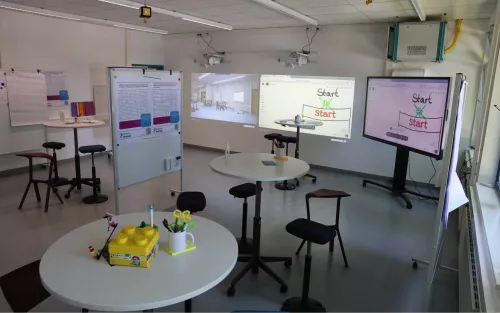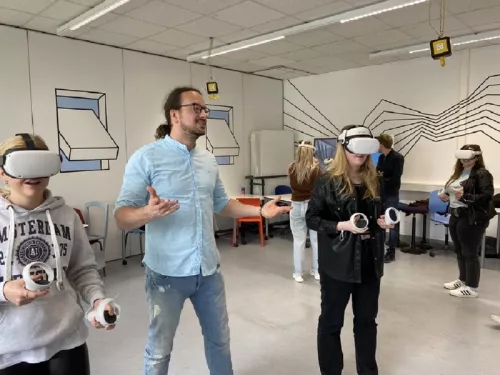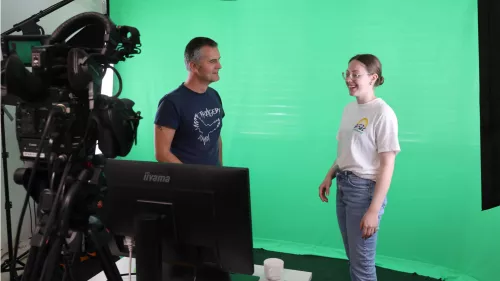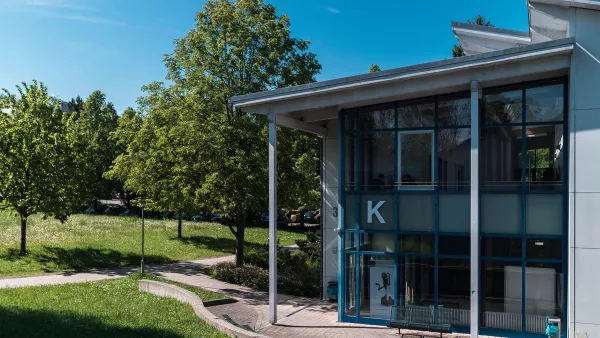Profile
The Didactics Center in Building K is intended to be a meeting point for questions relating to teaching and learning.
The center features the LearningLab (a versatile experimentation and teaching room), the film studio, the Immersive LearningLab and coworking areas for students. There will also soon be flexible teaching/learning rooms on the upper floor.
The DidacticsCenter offers space for innovative teaching, project work and agile and creative working methods.
Our service for you
- Room solo
Book the LearningLab for project meetings, as a meeting room or workspace. - Room with the support of university didactics
The university didactics team will help you set up the room and provide an introduction to the room and materials. - Room "with everything"
Are you brave enough to try new ways of teaching? The university didactics team will be happy to work with you to design various options for use. - Materials and equipment to go
You can also use materials and methods for this type of teaching in other rooms at the university. - Student teams
The University Didactics Department opens the LearningLab; on request and by arrangement, the University Didactics Department can supervise and support student groups. Student working groups can book the LearningLab independently for their project work. Or you as a lecturer can book the room for small teams on your course.
Can be booked by lecturers, staff AND student groups for individual events or entire semesters.
Book by e-mail to spend@rwu.de
Dates
All eventsCreated as part of the university didactic project T.E.A.-House
by the Baden-Württemberg Ministry of Science and Culture
Offers in the Didactics Center
- Fortbildungsflyer Wintersemester 2024/25 (PDF, 492.91 KB)Hochschuldidaktik Fortbildungsflyer für das Wintersemester 2024/25
LearningLab

LearningLab
The LearningLab can be booked and used for all courses and meetings that require a more active setting. Teachers, student groups and staff can try out different room settings for teaching and learning. In addition to group work, workshop formats and agile methods such as design thinking, simulation games and many forms of project work are conceivable. Digital settings on site in plenary sessions or in small groups are also possible thanks to the tablets, mobile screens and stable Wi-Fi available.
The LearningLab can be booked for individual appointments or the events of an entire semester. The room offers space for 25-30 participants and can be expanded for up to 50 people.
Examples of possible uses:
- Project-oriented teaching - e.g. group work to define project goals and draw up a work plan.
- (Student) project group meetings - working together on the big screen.
- Design thinking in teaching
- Presentation training, including VR-supported training units
Equipment:
- Flexible room layout with movable whiteboards and pinboards
- A total of 7 mobile and height-adjustable group work tables
- Bar stools and standing aids that promote agile working methods
- Large-format multi-touch screens (65 - 85 inches), which can be used for digital display (flipchart/digital board) or virtual group work
- Course set of tablets including classroom management
Materials:
- Moderation material and visualization case
- Material and tools for prototyping - from glue sticks to Lego Serious Play
Further material can be obtained on request.
Special features of the LearningLab
The special feature of the space is the flexible abundance of equipment and possibilities. The LearningLab is approx. 120 square meters in size, can be divided with a flexible wall in the middle, is set up as a creative, agile project space and is fully digitally equipped. The LearningLab is therefore particularly comprehensively equipped to allow experimentation with a wide range of possibilities and combinations. It is the result of a lengthy process and the equipment to date has been financed by two project grants.
The furniture consists of height-adjustable, rather small, combinable tables on castors and matching seating. In addition, various group work niches are available in front of the room in the co-working area to enhance the concept. The furniture represents the counter-concept to the fixed rows of seats in traditional rooms, is designed for agile and creative work and is intended in particular to support the activation and exchange of ideas between all those present.
The other media-didactic equipment aims to overcome predetermined spatial boundaries didactically (and intellectually). Four different teaching/learning settings (4ALL) are available for this purpose, which can also be combined with each other in different sequences. What all settings have in common is that they emphasize the activating character with working materials that are always at hand for everyone present (4ALL) and not just for the teacher.
Real
By a "real" media didactic setting, we mean the use of mobile whiteboards, pinboards and flipcharts. Moderation and work materials are available to participants on mobile team trolleys (from sticky notes to inspiration cards and timers). Based on the phases of design thinking, observation, brainstorming and prototyping are supported by furniture and materials. Methodological tips and prepared workshop elements are also provided. The appropriate workshop and advisory program for teaching staff and student groups offered by the University Didactics department rounds off the offer.
Digital
The room is equipped with special hardware and software: Interactive projector wall, digital "flips" and large-format multi-touch screens (65-85 inches) as well as a class set of tablets including classroom management are central components of the digital setting. The room also has access to special IT services such as Collaboard, ARSnova, its own Nextcloud and Cryptpad. The digital technology is not primarily used for the purpose of presentation, but should - as in the normal working world - be available to the participants for (collaborative) work: From research and creative processes to prototyping. We can also experiment with the methodological advantages of distance learning (chat, anonymous questions, surveys) in face-to-face and hybrid teaching. Suitable didactic concepts, support and supervision are provided by our media didactics expert, who is on site and looks after the room, among other things.
Virtual
The integrated Immersive LearningLab can be seen as a gateway to virtual worlds and diversifies the room's offerings with virtual elements. The equipment has been selected so that course participants can immerse themselves in virtual worlds as well as create their own VR worlds (3D scanner, software, experts).
CoWorking
For focused individual and group work, e.g. project-oriented work, students have access to appropriate furniture in the co-working space. So far, students have tended to concentrate on working at home with digital tools and there is hardly any space for joint teamwork - outside of the event rooms - for the alternation of creative collaboration, i.e. open co-working and concentrated individual work, which is also particularly praised in "New Work".
"There are no limits"
The LearningLab therefore offers a large number of didactic and methodological possibilities and combinations; everything from classic short lectures to hypermodern virtual group work and back again can be realized in one and the same room. In terms of equipment, the room is virtually over-equipped. This is deliberately designed so that it can fulfill its role as an experimental space. In the spirit of double enabling didactics (Arnold 2019), the four settings (4ALL) can be completely mixed and matched by the users (students and teachers) at any time. This has created a playground that invites everyone to experiment and also allows the methodology to be opened up in terms of the "shift from teaching to learning".
Immersive LearningLab

Immersive LearningLab (I:L:L)
Tell me and I'll forget. Show me and I remember. Let me do it and I will remember.
Confucius (551 - 479 BC)
Immersive learning means "diving" into an unknown context in a natural way. Dangerous, difficult or fictitious situations can be simulated and safely mastered and understood. The three-dimensional representation of and interaction with the learning object allows facts to be realistically illustrated and more easily understood by users. In contrast to other media, learning with a virtual medium enables so-called "learning by doing", which demonstrably improves learning success and follows the Confucian statement quoted above. We are happy to accompany you during your first "immersion" and your first experiences, thus enabling a didactically low-threshold introduction. We will also be happy to discuss any project ideas with you.
The basic principle is: Low-threshold and open to all!
Open door into Virtual Reality...
Workshop size:
The Immersive LearningLab is part of the LearningLab and offers space for 25 to 30 participants. Thanks to the flexible equipment, the Immersive LearningLab can also be used for up to 50 people.
Equipment:
- 3D scanner
- VR glasses
- Mixed reality glasses
- Augmented reality glasses
- Drone
The 4 E's of the Immersive LearningLab
1. experience
We want to enable everyone to "experience" immersive experiences of all kinds in order to feel the sense of presence and its power, especially in the promotion of learning processes! To this end, there will be open "experience hours" where you can simply drop by and try out a few experiences and collaborations. You can also book group appointments.
2. create
We want to offer support and advice for teachers and students in the creation of immersive learning/training environments for courses or as part of project and thesis work. To this end, we offer both the complete supply program as well as individual consultations in software, hardware (360 degree cameras, 3D scanners), storytelling and, of course, didactics.
3. research
As the Institute for Innovative Teaching and Applied Teaching and Learning Research (I3L), we want to actively promote research (including critical research) into the use of immersive media in university teaching. For this reason, the I:L:L will conduct various forms of accompanying research. Among other things, this will deal with the impact, compatibility and didactic principles of immersive learning processes.
4. enabling
We want to make immersive "training" possible for all university members, both in the I:L:L with high-quality glasses and scalable at home with a smartphone and RWU cardboard. An RWU immersive learning platform is to be created for this purpose, which will also record progress and provide feedback with the help of data protection-compliant learning analytics.
Current projects
Here you will find a selection of our current projects.
H-Scan
This is a 3D scan of the main building. A scan (digital twin) of the corridors and floors was made within 14 hours. The 3D scan can be integrated into websites, used for navigation or to give a better impression of the surroundings. For example, laboratories can also be virtualized and provided with interactive elements. The scans can also be walked through virtually using VR glasses.


K-Environment
The K-Environment is created as a multiplayer VR application to enter a virtual version of our Immersive Learning Lab together. It was recreated using a 3D scan as a reference.




LKT Park in Mozilla Hubs
A multiplatform application is shown in which audio, screen sharing and thus also co-working is made possible. A representation of the LKT building triangle was created using the integrated Spoke tool and then performance was optimized.

Conversation skills training in school social work
This is a virtual office for training social work students.
Three options have been created: formal at the large meeting table, more relaxed with cushions and armchairs and at the desk itself. The environment itself was designed in a modern style and will be brought to life in the future with animated avatars and corresponding dialogs.


![]()


Film studio

Film studio
High-quality videos are essential for teaching and learning. In our professional film studio, you can record elaborate contributions with (and without) support. The film studio offers numerous opportunities for lecturers. But students, student groups and RWU staff also have the opportunity to use the film studio for themselves.
Examples of possible uses:
- Educational videos
- interviews
- Laying technique
- Teasers on various topics
- Streaming with and without direction technology
- green screen
- Film editing
We would be happy to inform you about the numerous possibilities in our film studio and are also open to your ideas.
Equipment:
- Soundproofed and light-insulated room with modern lighting, sound and camera technology
- green screen
- Control desk equipped with video mixer and editing desk
- Screens
- lightboard
- VR and 360 degree camera
- Ring light with tripod for smartphones
- Gimbal and microphones for smartphones
- Equipment for podcasts
- Capturecard for recording HDMI sources
Learning café

Learning café
The permanent CoWorking Space on the first floor - your place to study and relax!
Are you looking for an ideal place to work or prepare for your exams and enjoy a little time out at the same time? Then the Lerncafé is the right place for you! The Lerncafé is open to everyone and is located in the Didactics Center in Building K. The Lerncafé invites you to linger and work and offers an inspiring atmosphere for individual students, student groups, lecturers and staff to work together. Here you will find the ideal mix of a concentrated working atmosphere and a cozy get-together.
Visit us at the Lerncafé. We look forward to seeing you!
Our offer at a glance:
- Space to learn, work and linger: On the first floor of the Didactics Center you will find several workstations. If the adjoining teaching and seminar rooms are not required for events, the Learning Café is regularly extended to provide even more space.
- CoWorking PLUS: The University Didactics Center offers the CoWorking PLUS offers and the weekly workshops in the Didactics Center. From Zotero and time management to the design of interactive PowerPoints, there is something for everyone.
- Learning and working together: Exchange ideas with other students or staff and learn or work together in a motivating environment. Here you will find like-minded people who will support and inspire you.
- Relax: Treat yourself to a little break! The Lerncafé is the ideal place for a little break in between. Enjoy the relaxed atmosphere with a cup of coffee or tea and recharge your batteries for the next lecture or meeting.
Barista times
| Tuesday | 13:00 to 14:00 and 16:00 to 17:00 |
| Wednesday | 12:30 to 16:00 |
| Thursday | 11:30 to 15:00 |
During barista hours we offer coffee and tea.
Contact & People
General contact details
| spend@rwu.de | |
| On campus |
Building K
Doggenriedstr. 38
88250 Weingarten |
| Postal address |
RWU Hochschule Ravensburg-Weingarten University of Applied Sciences DidacticsCenter P.O. Box 30 22
88216 Weingarten Germany |
Team of the Didactics Center



